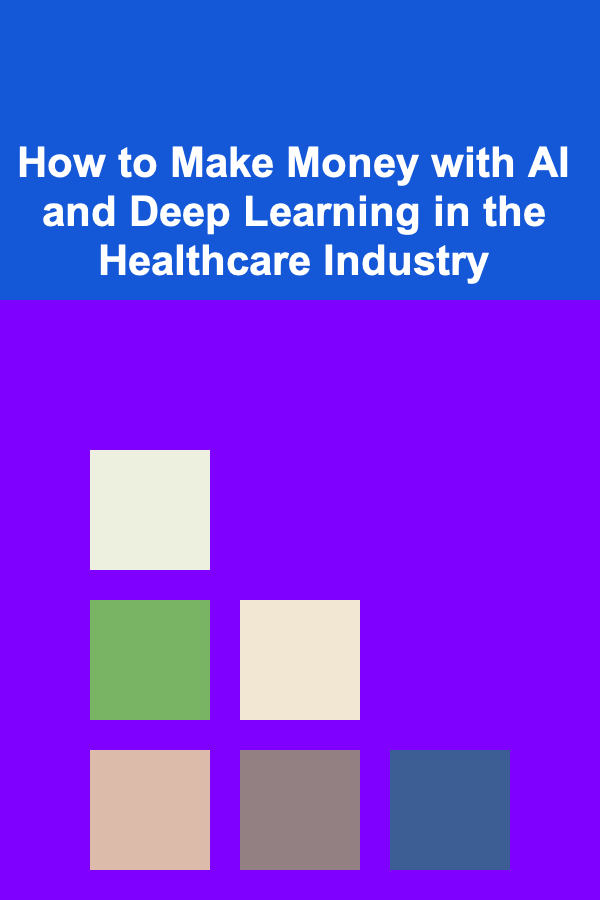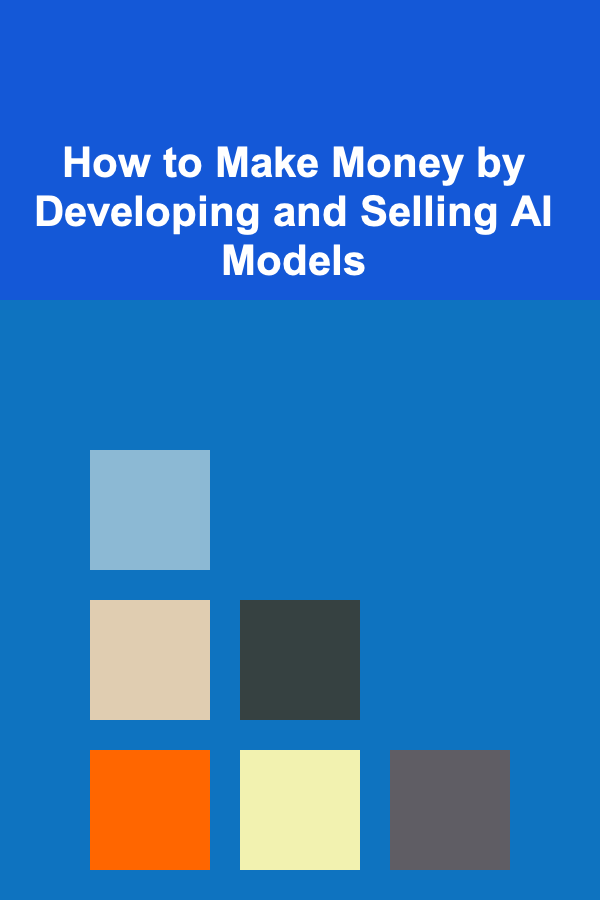
How to Make Money with AI and Deep Learning in the Healthcare Industry
ebook include PDF & Audio bundle (Micro Guide)
$12.99$5.99
Limited Time Offer! Order within the next:

Artificial Intelligence (AI) and Deep Learning (DL) are revolutionizing various industries, with the healthcare sector being one of the most promising fields for transformation. AI and DL are opening up new opportunities for improving patient care, enhancing operational efficiencies, and generating significant financial returns for innovators, startups, and established organizations. In this article, we explore how individuals and businesses can leverage AI and deep learning to generate income within the healthcare industry.
Understanding the Role of AI and Deep Learning in Healthcare
Before diving into monetization strategies, it is essential to understand the role of AI and deep learning in healthcare. While AI refers to machines designed to mimic human intelligence, deep learning is a subset of AI that involves training neural networks with large datasets to enable them to perform complex tasks such as pattern recognition and decision-making. In healthcare, these technologies are used for a variety of applications, including diagnostics, drug discovery, personalized medicine, and healthcare operations.
Applications of AI and Deep Learning in Healthcare
-
Medical Imaging and Diagnostics Deep learning models are being employed to analyze medical images such as X-rays, MRIs, CT scans, and ultrasounds. These models can identify abnormalities like tumors, fractures, and diseases with remarkable accuracy, often surpassing human radiologists in certain cases.
-
Predictive Analytics for Patient Outcomes AI-powered models can analyze large datasets of patient records to predict potential health risks, future medical conditions, or treatment outcomes. Predictive analytics can help healthcare providers offer proactive care and make data-driven decisions.
-
Drug Discovery and Development AI and deep learning are accelerating the drug discovery process by predicting how different compounds will interact with biological systems. This enables pharmaceutical companies to identify potential candidates more quickly and cost-effectively.
-
Personalized Medicine Deep learning can help create personalized treatment plans by analyzing patient data and predicting how they will respond to different treatments based on their genetic makeup, lifestyle, and medical history.
-
Healthcare Operations Optimization AI can optimize hospital management, staffing, patient flow, and supply chain logistics, improving operational efficiency and reducing costs.
Monetization Opportunities in AI and Deep Learning for Healthcare
The application of AI and deep learning in healthcare presents multiple avenues for generating income. Below are some strategies to consider for monetizing AI and deep learning technologies in this field:
1. Developing and Selling AI-Driven Medical Software
One of the most direct ways to monetize AI and deep learning in healthcare is by developing software solutions that can be sold to healthcare providers, pharmaceutical companies, or research institutions. These solutions can range from diagnostic tools to predictive models, and they can be licensed on a subscription or one-time payment basis.
Examples:
- AI Diagnostic Tools: A deep learning-based tool that automatically analyzes medical images and flags potential issues, helping doctors diagnose conditions like cancer, heart disease, or neurological disorders faster and more accurately.
- Patient Risk Prediction Software: A predictive analytics solution that assesses a patient's risk of developing certain conditions (such as diabetes, stroke, or heart disease) based on historical data and lifestyle factors.
- Personalized Treatment Platforms: AI platforms that suggest personalized treatment regimens based on a patient's genetic data, history, and other health metrics.
Revenue Model:
- Subscription Model: Offer the software as a subscription-based service where healthcare providers pay a recurring fee for access.
- License Fees: Charge healthcare organizations a one-time licensing fee to use the software across their network.
- Pay-per-use: Charge healthcare providers based on the number of analyses or predictions the system performs.
Steps to Success:
- Identify a specific healthcare need: Look for areas within healthcare where AI can provide a solution, such as diagnostic accuracy or workflow automation.
- Develop or license the technology: Build or license AI models from companies specializing in healthcare AI and adapt them for your target market.
- Market your product: Reach out to healthcare providers, research organizations, and pharmaceutical companies to demonstrate the value of your AI-driven software.
2. Creating AI-Powered Healthcare Devices
Healthcare devices that incorporate AI and deep learning technologies represent a fast-growing market. AI can be integrated into wearables, diagnostic devices, and therapeutic machines to improve their functionality and precision.
Examples:
- Wearable Health Monitors: AI-powered wearables that monitor vital signs like heart rate, blood pressure, oxygen saturation, and more. These devices can alert patients and doctors about potential health risks in real time.
- Smart Diagnostic Devices: Devices that incorporate AI to diagnose conditions based on user inputs or sensor data (e.g., glucose meters that predict insulin needs based on patterns identified by AI).
- Robotic Surgery Assistance: AI-powered robots that help surgeons perform precise and minimally invasive surgeries.
Revenue Model:
- Direct Sales: Sell the devices directly to healthcare institutions, clinics, or consumers (in the case of wearables).
- Subscription Services: Offer ongoing services such as cloud-based health data storage, analytics, and monitoring on a subscription basis.
- Licensing Technology: License your AI algorithms to manufacturers of medical devices.
Steps to Success:
- Collaborate with device manufacturers: Work with companies that specialize in medical devices to incorporate your AI models into their products.
- Conduct trials and validation: Ensure your device and AI model are validated for medical use, meeting regulatory standards such as FDA approval or CE marking.
- Launch and scale: Once your device is ready for market, launch it and focus on scaling through partnerships with healthcare organizations.
3. AI-Powered Healthcare Data Analytics Services
Healthcare providers, pharmaceutical companies, and research institutions are increasingly relying on AI-powered data analytics to make better decisions. As a service provider, you can offer advanced data analytics platforms that help organizations analyze large healthcare datasets to uncover insights and improve outcomes.
Examples:
- Clinical Trial Data Analytics: Offer AI-powered services that analyze clinical trial data to help pharmaceutical companies identify the most promising drug candidates more quickly.
- Patient Outcome Prediction: Provide hospitals with predictive models that analyze patient data to forecast treatment outcomes and optimize care plans.
- Healthcare Market Research: Use AI to analyze trends in healthcare markets, such as patient behavior, treatment efficacy, and drug effectiveness.
Revenue Model:
- Service Fees: Charge clients based on the volume of data processed or the specific analytics service provided.
- Subscription to Analytics Platform: Offer access to a cloud-based platform that provides ongoing analytics services for a monthly or yearly subscription fee.
Steps to Success:
- Develop AI analytics tools: Build deep learning models capable of extracting valuable insights from healthcare data such as patient records, medical images, or clinical trial results.
- Target healthcare organizations: Market your services to hospitals, research labs, and pharmaceutical companies that need advanced data analysis.
- Ensure compliance: Make sure your data analytics comply with healthcare regulations such as HIPAA (Health Insurance Portability and Accountability Act) in the U.S. to protect patient privacy.
4. AI-Driven Telemedicine Solutions
Telemedicine is experiencing rapid growth, and AI can significantly enhance its capabilities. By integrating deep learning models into telemedicine platforms, you can offer solutions that improve the accuracy of virtual consultations, reduce the workload of healthcare professionals, and make healthcare more accessible to people in remote areas.
Examples:
- AI Chatbots for Patient Intake: Develop AI-powered chatbots that handle patient intake, asking patients relevant questions and providing initial assessments before they see a doctor.
- Virtual Health Assistants: Create AI-driven virtual assistants that provide ongoing health monitoring and personalized recommendations based on a patient's health data.
- Remote Diagnostics: Integrate AI to analyze patient data collected during virtual consultations, such as photos or videos of symptoms, and provide diagnostic recommendations.
Revenue Model:
- Subscription-Based Telemedicine Platform: Charge healthcare providers or patients a subscription fee for access to the telemedicine platform.
- Consultation Fees: Generate income by offering AI-assisted consultations where healthcare providers pay a fee to access the AI diagnostic features.
Steps to Success:
- Build a telemedicine platform: Develop a secure and user-friendly telemedicine platform that integrates AI tools for diagnosis, patient intake, and consultation.
- Collaborate with healthcare providers: Partner with healthcare institutions to offer your platform to their patients.
- Monetize the service: Charge fees per consultation, or offer subscription-based access to AI-powered features.
5. Investing in AI-Driven Healthcare Startups
For those with capital to invest, another way to profit from AI in healthcare is by funding AI-driven healthcare startups. Many AI and deep learning startups are emerging in the healthcare sector, working on innovations such as medical diagnostics, drug discovery, and healthcare management.
Revenue Model:
- Equity Stake: Invest in startups and earn a return through equity appreciation, dividends, or an eventual exit via acquisition or IPO.
- Profit-sharing: Some investment deals may allow you to receive a percentage of the profits from the startup's revenue.
Steps to Success:
- Identify promising AI startups: Conduct due diligence to identify startups that have innovative AI solutions with strong market potential in healthcare.
- Invest capital: Provide funding in exchange for equity or a share of future profits.
- Monitor and support growth: Help the startup grow by offering strategic advice, networking, and business development support.
6. AI-Enhanced Health Data Security and Privacy Solutions
As healthcare data becomes increasingly digitized, the need for robust security measures grows. AI can be used to detect anomalies in healthcare data access patterns and prevent breaches in real-time. Developing AI-powered security solutions for healthcare organizations is an area where deep learning can add value.
Examples:
- AI-Powered Intrusion Detection Systems: Use AI to monitor healthcare IT systems for signs of unauthorized access or data breaches.
- Data Anonymization and Encryption: Develop AI-based tools to anonymize or encrypt patient data to ensure compliance with privacy laws and regulations.
Revenue Model:
- Software as a Service (SaaS): Offer your AI-powered security solutions as a SaaS product, where healthcare organizations pay a subscription fee for ongoing security services.
Steps to Success:
- Develop AI security tools: Create AI models capable of detecting and preventing security breaches in healthcare data systems.
- Market to healthcare providers: Focus on marketing your security solutions to hospitals, clinics, and healthcare providers who need to comply with data protection laws.
Conclusion
The healthcare industry presents a wealth of opportunities for making money with AI and deep learning. From developing diagnostic tools and telemedicine platforms to creating personalized medicine solutions and offering data analytics services, the potential for innovation and profit is vast. With the right expertise and strategy, businesses and individuals can leverage AI and deep learning to not only improve patient outcomes but also build lucrative ventures in this fast-growing field.
As AI continues to evolve, so will the opportunities to profit from its applications in healthcare. Whether you are a developer, investor, or entrepreneur, now is the time to explore how AI can help shape the future of healthcare and unlock new income streams.
Reading More From Our Other Websites
- [Organization Tip 101] How to Choose the Right Driveway Sealer for Your Surface
- [Biking 101] How to Choose the Best Spin Bike for Your Home Gym
- [Home Rental Property 101] How to Set Up a Rental Property Emergency Fund
- [Organization Tip 101] Why Setting Up a Weekly Meal Prep Station Saves Time
- [Hiking with Kids Tip 101] The Ultimate Backyard to Mountains Quest: Creative Hiking Challenges for Kids and Parents
- [Personal Care Tips 101] How to Choose Hair Gel That Works Well in Different Weather Conditions
- [Home Family Activity 101] How to Bake Delicious Memories: Baking with Kids from Beginner to Master Chef
- [Organization Tip 101] How to Keep Track of Important Deadlines with a Planner
- [Home Family Activity 101] How to Make Family Fitness Time Fun with Dance Challenges
- [Home Security 101] How to Build Your Own DIY Home Security System: A Beginner's Guide

How to Add Value to Your Home Through Simple Staging Changes
Read More
How to Get Your Kids Involved in Gardening and Nature Activities
Read More
How to Make Money by Developing and Selling AI Models
Read More
How to Save Money on Home Improvement Supplies
Read More
How to Prepare Easy & Delicious Side Dishes
Read More
How to Use a Small Vice for Holding Bike Parts Securely
Read MoreOther Products

How to Add Value to Your Home Through Simple Staging Changes
Read More
How to Get Your Kids Involved in Gardening and Nature Activities
Read More
How to Make Money by Developing and Selling AI Models
Read More
How to Save Money on Home Improvement Supplies
Read More
How to Prepare Easy & Delicious Side Dishes
Read More